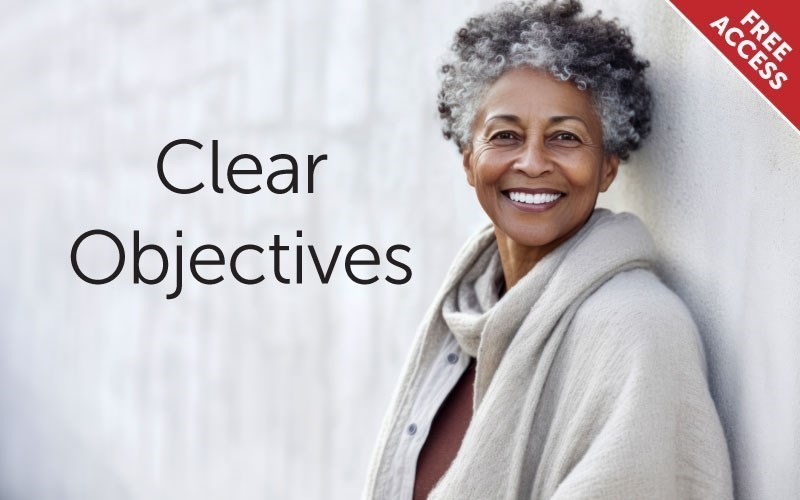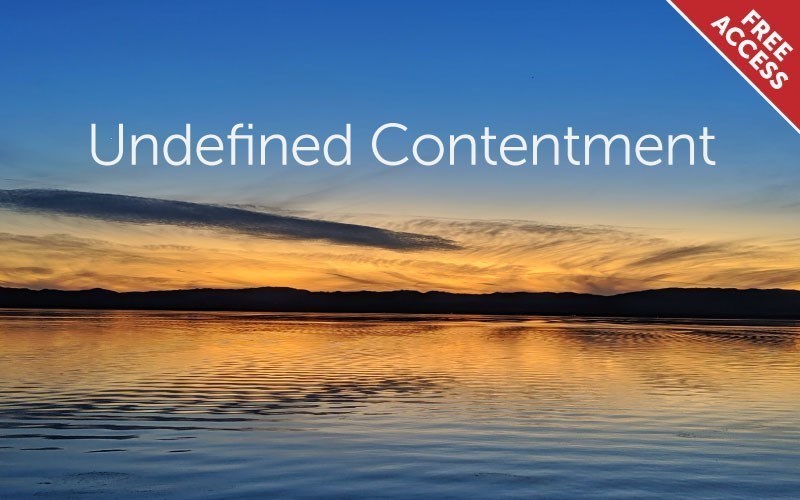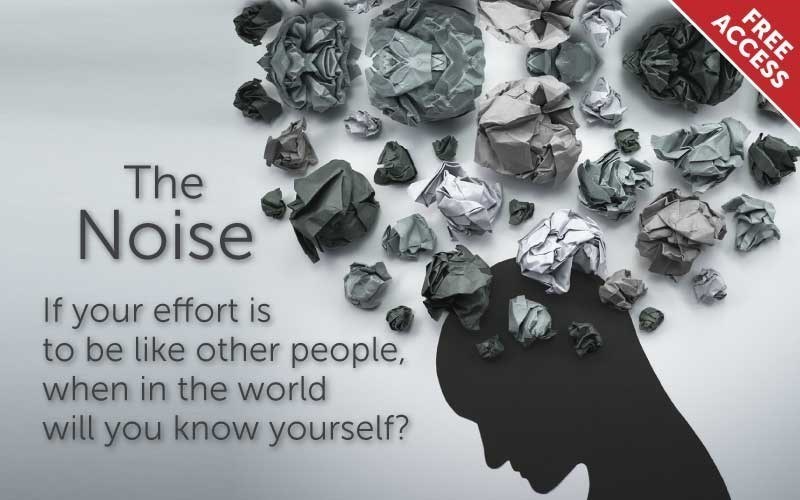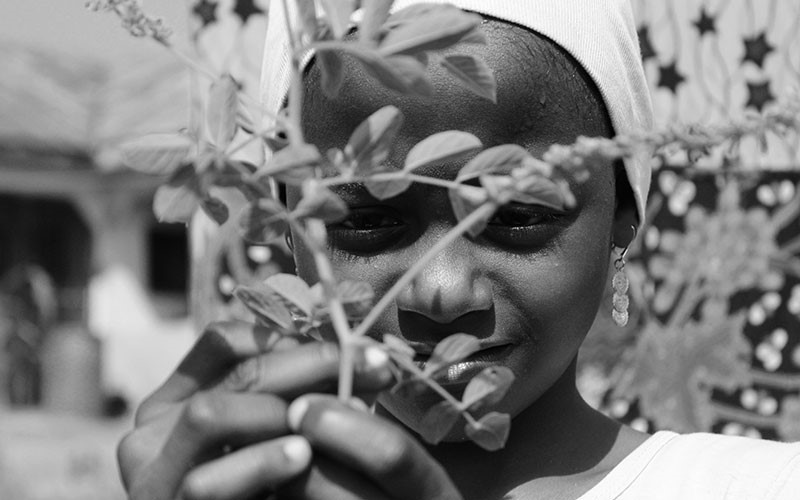Topics
 00:07:00
The Great Pyramids
Video
Duration : 00:07:00
The good is like a pyramid. Just a little bit at the top, and a lot more, the fu...
00:07:00
The Great Pyramids
Video
Duration : 00:07:00
The good is like a pyramid. Just a little bit at the top, and a lot more, the fu...
So now let me tell you about the good and the bad. The good is like this—like a pyramid. Just a little bit at the top, and a lot the further down you go. The bad is like an upside-down pyramid. You see all the consequences; you see all the problems; you see all, “Oh, this is terrible, oh....” But if you get down to the bottom of it, it’s just one little thing.
And the good is the same way, but upside down. You hardly see it, that it’s good. It’s so little on top; you hardly notice there is anything good. But keep digging; it gets better, and better, and better, and better, and better.
Next time, look carefully—because that’s how you keep missing the good and falling into the trap of the bad—because the bad is huge. It comes with its problems blaring right in your face. And how does it resolve itself? It turns out to be a little thing, tiny little thing.
Tiny little thing. The good? Inversely? All you get to see at first is this tiny little thing, but if you accept—and most of the time you will overlook it, what is the good.
Let me give you an example; this will maybe clarify the two pyramids. You wake up in the morning—you wake up in the morning, right? You come to your kitchen or family breakfast area, and there is your family. And you notice that one of your kids, he’s just angry.
“Dah-deh-deh-deh-deh-deh, dah-deh-deh-deh-deh-deh, this is wrong; that’s wrong; I don’t want to go to school; I’d, I’d, I’d, I’d, I hate school; why do I have to go to school, Dad?” You’ve seen all this. Get to the bottom of it: “I didn’t do my homework.”
The good? You come downstairs and that child says—now in good mood because you let them stay out of school, so they could finish the homework, and then they can—“Good morning, Dad.” There is your opportunity, in that “good morning, Dad.” If you took it: “How are you today?” you have just converted raw strings into metal chains of relationship, of love.
But most of the days, you just, “Yeah, good morning.” You missed it; you have missed it. Somebody says to you, “I love you.” And what are you good at? “I love you too.” You, you just missed it. Just missed it.
And here comes a breath into you, and maybe you took that one minute, sat down somewhere, and you went, “Hmmmh, hmmm....” Just that one breath—you missed it. You missed it, because now you’re thinking about this and you’re thinking about that. But you just could have sat down, as you are, as you did and understand you have the gift of life.
And you keep going; it’ll get more and more and more and more and more and more and more, and you will begin to fill with gratitude. And from then on, it’s like fireworks. “Vvrr-vvrr-vvrr-vvrr, vvrr-vvrr-vvrr....”
The bad, we go for; good—we have not learnt how to detect that little, little, little thing of good. So, your dharma, or dharm, begins to be that duty that you have to the self, to not miss those little things in your life—the opportunity to fill your heart with gratitude, the opportunity to acknowledge what you have been given.
Aren’t you good at knowing when the problem is coming your way? “Aye-aye-aye-aye!” Are you also that good at knowing when the good is coming your way? Because if you were, you would realize, it’s so much good just keeps coming, and coming, and coming, and coming, and coming, and coming. That’s life!—the gift that you have been given.
- Prem Rawat
 00:06:06
Clear Objectives
Video
Duration : 00:06:06
“Have you been looking for perfection in an imperfect world? … You’re not going ...
00:06:06
Clear Objectives
Video
Duration : 00:06:06
“Have you been looking for perfection in an imperfect world? … You’re not going ...
Prem Rawat:
Let me ask you a question. Have you really been looking for perfection in an imperfect world? Have you? You’re not going to succeed; sorry! You’ve wasted your time. You’re not going to find it. Not outside. The only place you’re going to find it is within you.
Didn’t I tell you that a long time ago? [Audience: Yeah.] So then, why were you looking for perfection in an imperfect world?
What is this? What is this? We stand at the cusp, at the threshold, of such a possibility to truly change people’s lives. And not just change people’s lives who have a comfy living room. But to change people’s life who are in the midst of that hell.
When I go to South Africa – which I really enjoy going to. Because I know I am helping those people who truly are in that burning hell.
There’s one lady in South Africa lives almost homeless. Very bad living conditions. Living in the Soweto ghettoes, and the ghettoes there are horrible. But a heart so pure. And she wants to help others. She wants to take the Peace Education Program to others.
Not complaining about herself. Not complaining about her situation, not complaining about her living conditions. But a heart of gold.
And this? And you know, ah! I know a lot of people, a lot of you don’t do this but some of you do! Nitpick, nitpick, nitpick, nitpick, nitpick, nitpick, nitpick. Why?! You don’t have to.
You know, one time I read this story; I was in India. And somebody went into the temple and took off Krishna’s clothes on the statue, and put jeans on him. Now, of course, I love this story. From everything that I have seen about Krishna, he was cool. So, obviously, he would have worn jeans if he was now.
And people were so upset – and that was, to me, so entertaining. Do you really go and worship Krishna in your temples? Or do you really go and worship his clothes? If you don’t worship his clothes, then what difference does it make what he’s wearing – or if he’s wearing nothing?
What do you worship? Why did you come to Knowledge? So you can become nitpick experts? Well, I guess Knowledge has helped you with that too. Because some of you are experts at it.
And so, yeah. My recommendation? Don’t try to make bread out of the little flour that’s on your clothes. Just brush it off. Move on! Make sure that your objective is very clear to you every single day! And your objective is what? To be in peace.
 00:04:35
Undefined Contentment
Video
Duration : 00:04:35
It is very hard to be conscious when you are in the company of nothing. But it i...
00:04:35
Undefined Contentment
Video
Duration : 00:04:35
It is very hard to be conscious when you are in the company of nothing. But it i...
What is the undefined contentment? When you understand it is not based on anything – but it is to be content.
“I will have contentment if I have this!” That’s what happens in that world of “It isn’t, wasn’t, won’t be.” (I should keep it straight for my own thinking.) It wasn’t! Isn’t, and won’t be. The power! The power is not that that “wasn’t, isn’t, and won’t be.” The powerful is the one that was, is, and will be – forever.
Past the human species. Past! Was before there was anything called human, anything stirred, any dirt hadn’t even come around to form the earth. And it was there. Is there – even through this stupid pandemic, is there. And will be there even after this pandemic. Even after the human beings. Always.
When that is your source, now you have connected onto something incredibly meaningful. And when you have connected to that something incredibly meaningful – your life becomes meaningful. Every moment becomes meaningful. Because it is very hard to be conscious when you are in the company of nothing. But it is very easy to be conscious when you’re in the company of everything.
And the tragedy, the tragedy would be to be in the company, (because there is no way you can be anywhere on the face of this earth and be devoid of that company of the infinite) – and not to have recognized that, but rather have connected with all that that wasn’t, isn’t, and won’t be. That’s what I wanted to tell you. That’s what I wanted to tell you.
And if you want to give it a thought, give it a thought. There are two. Being conscious is: “What choice are you making? Are you connecting with that which it isn’t? Or are you connecting with that which is, and will be, and was?” And this is our opportunity. And it begins with each one of us.
 00:07:17
The Noise
Video
Duration : 00:07:17
"If your effort is to be like other people, when in the world will you know your...
00:07:17
The Noise
Video
Duration : 00:07:17
"If your effort is to be like other people, when in the world will you know your...
(Prem Rawat) Each one of you has a tape playing in your head. (In my book, I call it “noise.”) You allowed that tape recorder to record. I’m not saying it’s your fault. Because that’s also your nature. You were given an empty tape recorder: “Record.” And you recorded some good things.... (Few and far in between.) Mostly, what you did manage to record was one hundred percent pure noise.
And what do we do? We listen to that noise again and again and again and again and again, trying to make meaning of it. Because it’s in our tape recorder.
And you can’t make meaning of it. It has no meaning. But people listen to that noise; again, “You should be doing this; you should be doing that; you should be more mindful of this; you should be careful of this. You know, you have to pay respect to that person. Oh, but, yeah, well, what do these people think about you?” That’s the big one: “what other people think about you.”
So many of us want to be like other people. If your—if your effort is to be like other people, when in the world will you know yourself? How could you know yourself? When would you have the time to know yourself?
So, what are we trying to solve? When the reality is very, very simple; you are a human being, and your needs are very, very simple. You need to feel peace in your life. Peace is not absence of war. Peace—if you want to say is absence of war—if you want to say is absence of war, then it is the war that rages within you. Not the outside one.
This euphoric scenery that we have created for ourselves, that’s not the reality. The euphoric scenery is, “Everybody will not fight; everybody will get along with each other.... You will give your food to the other person,” (even if they don’t want it).
This euphoric scenery that we have created is not the right one. What we need to do is turn within! Like a mirror. And see and feel, look of who you truly are. Understand your simple needs.
You understand your wants, and at this point in time, it has become so bad, you don’t even know the difference between wants and needs. You can live without wants; you cannot live without needs. That’s the difference.
What have you allowed to come in into you is jealousy, fear, anger.... Not kindness. Not love. Not understanding. And you are expecting what? What results are you expecting? If you’re going to keep inviting thieves in your house, be prepared to have a few things missing.
Anger, fear, jealousy, all of these are thieves; they rob you! And so, a few things are going to be missing! That’s, that that’s what thieves do! They steal!
Understanding, joy, peace, these are givers. They leave you presents; they give you things. What do you want? Do you feel poor? Do you feel rich? What do you want to feel?
When everything is not right, you get upset! When everything is right, you get joy; you get happiness; you get peace; you get kindness; you get understanding. All of these things.
 00:13:13
No Rules
Video
Duration : 00:13:13
An excerpt from Episode 3
00:13:13
No Rules
Video
Duration : 00:13:13
An excerpt from Episode 3
I thought this was kind of interesting, because I just today received a letter from Argentina—and so I’d like to read it to you; I brought it with me.
“Dear Mr. Prem Rawat, we’ve been watching the Peace Education Program for three months running. And we would like to thank you, because your message helps us know ourselves. When we listen to you, we forget that we are in prison. Thank you very much.
“With respect and love, we would like to invite you to this prison unit. It would be an honor for us to meet you in person and talk with you about what we have learned. Kind regards, Men’s Prison, Buenos Aires, Argentina!”
So, there I am at this prison; I said, “Okay, you know, you realize, God is the only one in this entire creation that can’t go from here to here.” And you should have seen their faces; it was like, “Huh? Of course God can go from here to here.”
I said, “No, it’s impossible for God to go from here to here. Why? Because if God leaves here to go here, it’s not possible, because he will always be here. And he is already here, so how can he come here? Can’t go from here to here!”
And when they heard—it was like, it takes a little while, right? Just, “dit-dit-dit-dit-dit, dut, dah-doo, dut, dit-dit-dit....” And then it’s like, “Damn, he’s right!”
Because I’m using that same logic. The problem isn’t the logic. The problem is the thing that created that logic—about “going,” about “coming,” about creating—not God creating us in his you know, shadow, but we creating God in ours. And giving God exactly the same attributes of jealousy, fear, anger, everything else.
“If you don’t do what I tell you to do, I’m going to destroy you.” Well, excuse me, that was the plot all along. So, what’s the news here!? I mean, isn’t that, in the creation, how it’s laid out? “I was, I’m going to be born, and one day I will be destroyed.” So what is this thing of “destroying?”
And it’s like, “Oh, well, if you don’t do these things, they’ll send you to hell.” Well, why do you have to send anybody to hell; it seems like we can create our hell right here all by ourselves; you don’t need a separate department. We, when everything is perfectly good—but there we are, suffering. And you wonder why. “Why are you suffering?”
“Oh, this happened, and then that happened....” So? So? Are you not concerned about what opportunity you have right now? Why are you attached to what happened yesterday—when yesterday has graciously said, “I’m out. I’m out of your life. You will never be able to get to me again!” And you’re like, “Yeah, well that doesn’t matter.”
You’re trying to contemplate, “What’s going to happen tomorrow; what’s going to happen tomorrow? What’s going to happen tomorrow? What happened yesterday; what happened yesterday? I don’t like this guy. I don’t like that guy. I, da-da-da, what’s going on here? Yeah.
“How, how come I’m not with that woman? How come I’m not with that man? How come I don’t have that car? How come I don’t—I’m not rich like that?” Day and night! “How do I get out of my problems?”
So, you see this letter, and the reason why I brought it is that they’re in the prison. They—and it’s not like, “Oh, we heard you and we got out. You know, there was a seven-question quiz and we passed from everything you had said, and then now we’re out.” No, they’re still in prison.
But when they listen and they savor that clarity, the bars are lifted; prison is opened. You’re no longer a prisoner; you are free. And that freedom is felt from within you. It is not sitting there and daydreaming, “Oh, yeah, I’m free.” Reality and dream are not colliding.
Because—and many times I’ve seen that first event that I—the transcript from that first event ever, when I was four years old—the satsang I gave, or the talk I gave. And it’s like, “You have to realize what this opportunity is”—this is that four-year-old talking—“you have to realize what this opportunity is, what you have been given here.
“And in realizing that opportunity, you shall find peace; you will find peace. In acknowledging that, you will get peace. In that clarity, you will find your freedom.”
Because freedom is not an independent state. Freedom is not an independent state; it is merely for those ties, those bonds that bind you to be severed. And when that happens, when that process happens, when those ropes, those anchors that bind you, when they are severed, you automatically go into freedom. It’s, that’s it; that’s how—the only way you can get there.
But the question is, who binds you to these? You do. Other people offer you the rope, but you tie the knot. And who suffers? You do. And then you hear me say, “Cut it,” and you go, “Oh, that’s really difficult.” It wasn’t so difficult tying the knot, was it? Was it? It’s like, “Oh, yeah, okay, another rope. Wow, this is good; this is good.”
Because, you see, when you come to the realm of Knowledge, this is what’s really awkward about it—and really, really—and I have seen this since I was very, very young.
Everything out there has a set of rules, and you have to buy, accept that set of rules. If you don’t, you’re not going to graduate.
What do you want out of your life? Do you want that clarity? Do you want that simplicity in your life? Do you want that beauty that is possible in your life? And I was saying, “This is what’s different about Knowledge.” So, here’s what’s different about Knowledge.
Everything else requires you buy into that set of rules. If you don’t buy into the set of rules, “no go.” So anything you come to, like, “Okay, I want to be this,” or “I want to be that,” or—“Okay, here are the rules; here are the rules; here are the rules; here are the rules.”
Knowledge: no rules. “Just get in touch with your thirst.” If you’re not thirsty, no big deal—till you are! And when you are, look me up. If you are, let me help you.
No rules! This is befuddling to people. “Whaat? No rules?” No rules. “If I practice, just...?” Excuse me. “If I stop practicing Knowledge, will I go to hell?” No! “What? No rules?”
And believe you me, people try to create rules. “There have to be rules, so let’s make some rules. How can we not have rules? If the Christians have rules, if Hindus have rules, if the Jewish religion has rules, if the Moslems have rules, we have got to have rules.” And it’s like, “No. No rules.” And then, like, “Oh my God. What am I to do?”
So people ask, “What’s next?” The answer is, you are. You are next. Because, instead of focusing on everybody else, and everything else that is none of your business.... Instead of focusing on everything else and everyone else which is none of your business—this is not why you’re here—you need to focus on yourself. That’s your business. And that should be the only business you have.
And you are next! And you’d better be next on your agenda, my friends.
- Prem Rawat
 00:04:32
Mind Your Own Business
Video
Duration : 00:04:32
Your home doesn’t need happiness. If you focused on yourself to become happy, yo...
00:04:32
Mind Your Own Business
Video
Duration : 00:04:32
Your home doesn’t need happiness. If you focused on yourself to become happy, yo...
You know, you come here; you sit down and you listen—and things start clicking, maybe? And some people are like, “Well, it doesn’t click for me”—because you haven’t made it your business! You are not your business; that’s why it doesn’t click. You’re still caught up in everybody else’s business, which is none of your business.
“How can I,” people go, “how can I have a happy home?” Why are you trying to make your home happy? If there is ever a reason why your home is unhappy, it’s because of you and you alone—because you’re focusing on making your home happy. Home doesn’t need happiness. You need happiness. If you focused on yourself to become happy, your home would automatically become happy.
“How can I make my kids happy?” The only reason why they’re unhappy is because of you. There’s no other reason in this whole world. Because you keep poking your nose where it doesn’t belong. And they want you as far away from them as you can get. And Mars is not far enough.
Nobody is interested in figuring out, feeling in their lives the blessing of coming and going of this breath—but we want the new iPhone. The latest and the greatest gadget—and just like I was saying, when the guy has nothing to say, changing the microphone isn’t going to help.
That’s why, in social media, so much anger prevails. Because the word “social” means “how we get along together.” This is how we don’t get along together. And everything gets manipulated. And then there are the social media experts—and if you’re not one of them, pfft, forget it. And they can make and break the fortunes of millions.
Greed hasn’t gone; nobody has captured greed. They have given another avenue to greed, to proliferate, to go. Meanwhile, whether the greed, no greed; anger, no anger, and just, social media, no social media, new iPhone, new Android phone....
So, stop the noise by hanging onto the clarity, not losing it. How quickly can you lose the clarity? I go that-a-way; you go that-a-way; you walk two steps—gone.
Is that how vulnerable you are? Then where is your strength? Then where is your strength? Where is your strength? Your strength is in that tolerance. Your strength is in the kindness.
- Prem Rawat





